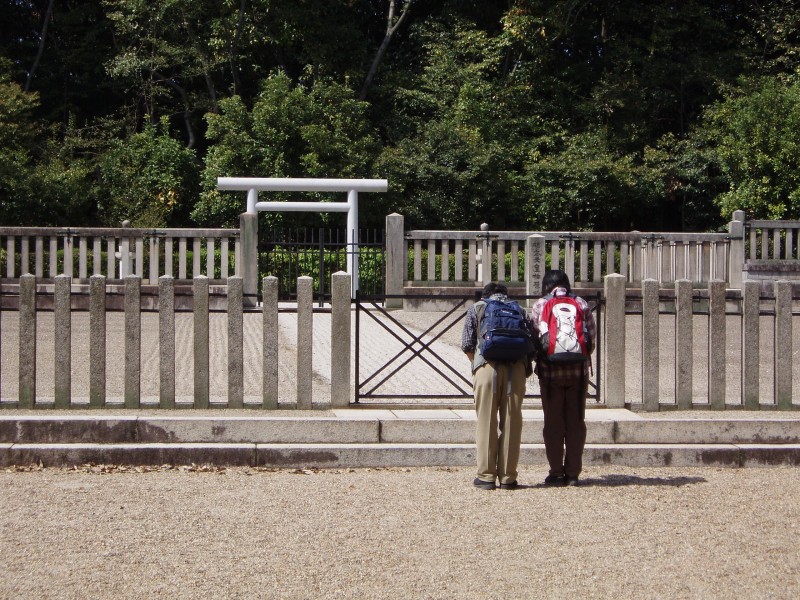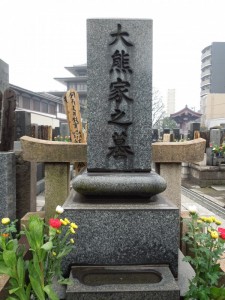Interesting Quote of the Day in Japan Today (
“Visiting a shrine to pray is different from being religious. It has nothing to do with religion. Most Japanese, including me, don’t think about whether we’re religious or not.”
A torii marks the entrance to another world, yet paying respects at graves is not thought of as being ‘religious’
The quote is by Yasunori Ueda, who visits the Ise Grand Shrine every summer to pray for his family and good health. Japan is one of the world’s least religious countries, according to a Gallup survey this year, but people of all ages continue to visit shrines at pivotal moments in their lives. (Christian Science Monitor)
One could explain the quote by reference to tourism, with Japanese behaving simply as people who visit churches in Britain out of historical and architectural interest. Such people might lower their voices as a sign of respect, even if they’re atheist.
Yet I’ve met several Japanese who vocally profess to be non-religious but neverthesless pray at shrines and graves. What’s going on? I think it has to do with the deep-seated nature of “ancestor worship” in Japanese culture, which is traditionally not seen as a religion but a natural process of mourning. ‘Thus men forget that All deities reside in the human breast,’ as noted by that most mystical of poets, William Blake.
You see the same kind of thing continually in American movies, where people visit graves and talk to their dead friends or family. No one calls that a religion either. It’s more like a deep sense of connection between the living and the dead. Their spirits live on in our memory and continue to play a real part in governing our lives. It’s what Lafcadio Hearn so eloquently pointed out in Japan. An Attempt at Interpretation, and the book remains a classic precisely because it does so much to explain the religious/irreligious nature of Japan.

Paying respects, even praying at an emperor’s grave is not seen as a religious act.


Perhaps we can find a term more fitting than “ancestor worship.”
Yes, thank you for pointing that out. It’s something I’ve noted earlier in other posts, and I’ve taken the opportunity of your comment to add italic marks to the phrase. Ancestor reverence might be a more suitable phrase…
In the West or at least the Abrahamic world, prayer is considered such a core religious activity, that the statement appears absurd. How can prayer not be religious? It’s part of the very definition of religion…
So I wonder if it’s a translation issue? Perhaps Yasunori Ueda used a Japanese word that has been translated as “religion” but actually has a slightly narrower meaning. Ueda-san mentions “thinking” about religion, so perhaps the Japanese word implies belief or some other kind of thought, rather than just activity.
Thank you for the input. I think you make a fair point, given that ‘shukyou’ in Japanese is a Western imported term. It’s a complicated issue, to which I’ve given quite a bit of thought. What exactly is it about Japanese religious practice that makes them think it’s not religious. It seems to be a notion derived from the Western definition of religion as denoting belief in a coherent ideology, as exemplified by the Abrahamic tradition. Since Shinto describes itself as vague, self-contradictory and unintellectual – without doctrine, dogma or founder – it may be that for many people even prayer is not considered ‘religious’ in the Christian sense.
Thank you for this intriguing piece. I am not familiar w/Hearn’s work & just bought it immediately.
Perhaps it also has to do with the concept of religion in the West being based in belief. shintô, and for that matter much of Buddhism, doesn’t require belief and is more focused on practices and actions. So for a shintô practitioner prayer isn’t about religion, but rather it’s a practice that is appropriate for a particular place or time.
‘Appropriate behaviour’ is a nice way of looking at it. Of course, the very term ‘Shinto practitioner’ is problematic. There are lots of people who take part in festivals for instance who wouldn’t consider themselves to be practising Shinto, yet in a sense are. It’s all very intriguing, and yet one more example of how Japanese ‘boxes’ don’t fit those of the West…
shintô practitioner is a short way of saying “one who engages in some shintô practices”. It’s preferable to shintôist, as that term has stong connotations of “an adherent or advocate of a specified doctrine, theory, or school of thought”. shintô practitioner emphasizes that much of shintô is based on highly localized traditional practices and not so much on organizational philosophy, dogma and credo.
Thanks for the input, Steven. The problem for me with ‘Shinto practitioner’ is that it’s a very Western way of looking at things, as if Shinto were a set of activities that one practices. What exactly are those practices, and who determined them? For example, I regularly visit shrines, attend festivals, and show respect when I do. Does that make me a ‘Shinto practitioner’? I don’t think so. Nor does, say, doing misogi make one a Shinto practitioner but rather someone who does misogi. I’ve never heard a Japanese say that they ‘practice Shinto’. It would be a very strange concept, I suspect. Being a Shintoist on the other hand is rather easy to understand, as it entails belief.